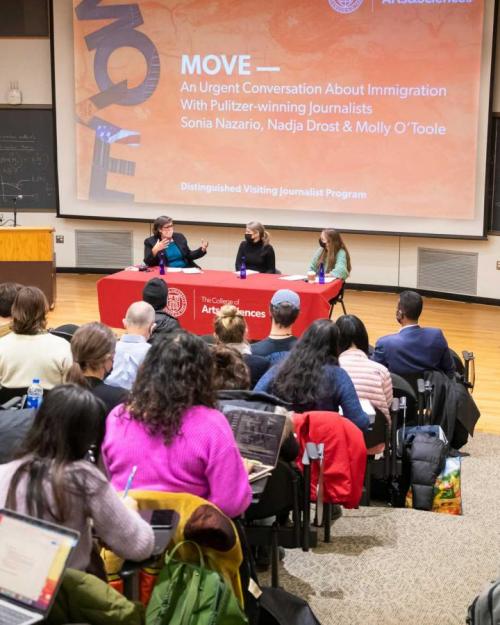In Honduras, Sonia Nazario met 10- and 11-old boys whose friends were murdered when they refused to join a gang and young girls who were forced to become girlfriends of gang leaders or watch their families killed. In Mexico, she met Enrique, a 16-year-old Honduran boy who risked his life to try to join his mother in the U.S.
“If your house is on fire, you’re going to run,” Nazario said of her experience interviewing immigrants as a journalist and author. “You don’t care about what’s going on at the U.S. -Mexico border, you just need to leave.”
Nazario, author the best-selling book “Enrique’s Journey,” was one of three Pulitzer Prize-winning journalists who shared stories of their work covering immigration and national security during a Dec. 1 on-campus event hosted by the Distinguished Visiting Journalist Program in the College of Arts & Sciences.
Nazario joined journalists Nadja Drost and Molly O’Toole ’09, the Zubrow Distinguished Visiting Journalist Fellow in A&S this semester, for “Move: An Urgent Conversation with Immigration Journalists.” Chiara Galli, a Klarman Postdoctoral Fellow in the sociology department who is studying migration, offered introductory remarks at the event. The event was also livestreamed on eCornell and is available for viewing by registering here.
“I stress the word urgent because that’s what this conversation is,” said O’Toole, an immigration and security reporter for the Los Angeles Times. “According to the UNHCR (the United Nations High Commission on Refugees), one of every 95 people has left their home because of conflict or persecution.”
The conversation explored various topics including the role of journalists vs. activists, trends in immigration patterns and suggestions for policy and procedural changes that could ease the U.S. immigration crisis.
As children of immigrants, both Nazario and Drost said they felt compelled to focus their work on human rights and social justice issues.
“As a journalist, there are a lot of reasons why you have to leave your biases at the door and report as objectively as you can,” Nazario said. “But I can be an activist in terms of the stories I write – about women, poor people, Latinos — people who don’t get enough ink in this country.”
For Drost, choosing journalism after working in environmental and human rights activism during her 20s, was a challenge. “Journalism, when it’s fair and rigorous, is about exposing injustices, holding systems accountable. You are informing people about situations, people and places they might not know about. And a huge part of activism is informing people about things they should care about.”
O’Toole said she’s found it interesting to watch the transition from the Trump to the Biden administration in terms of immigration. To her, not much has changed except the rhetoric.
“We’re still holding the administration accountable, but there’s been a backlash for journalists who are applying the same lens to the Biden administration as we did to the Trump administration,” she said.
When Nazario began covering immigration, most migrants were single men coming from Mexico seeking work in the U.S., but today, migrants look different, she said. There are more families and children, they are coming from all over the world and they are fleeing life-threatening situations, not just seeking better economic futures.
“Thirty years ago, there were 600 unaccompanied children coming across the border each year, now there are 400 a day,” she said.
These increasing numbers, combined with stricter immigration regulations, have created perfect conditions for a proliferation of smugglers, who provide help and protection to migrants, but at a high cost, said Drost, a journalist who works across print, radio, television and documentary film.
“The more some doors close, there will always be other doors pushed open,” Drost said, adding that deterrence policies haven’t worked to slow the number of migrants to the U.S./Mexico border.
What would work? The three panelists admitted that answers are complicated, but they did offer suggestions, which included addressing the root causes of immigration in countries such as Honduras and removing U.S. immigration courts from the political system.
Drost said she sees a need to expand the definition of asylum seekers to people who are fleeing their homes for other reasons, including climate change. She also said the U.S. needs to take a hard look at the inequity of its immigration policies tied to race and ethnicity.
Nazario, however, took a tighter line, saying the U.S. can’t accept all migrants and needs to prioritize people who are truly fleeing from harm. She supports deporting people who overstay their visas and those who don’t win their asylum hearings, if those hearings were fair.
“In the U.S., we forget that migration has been overwhelmingly positive for us,” she said. “We need to have a conversation about how many migrants we want and remove the politics.”




